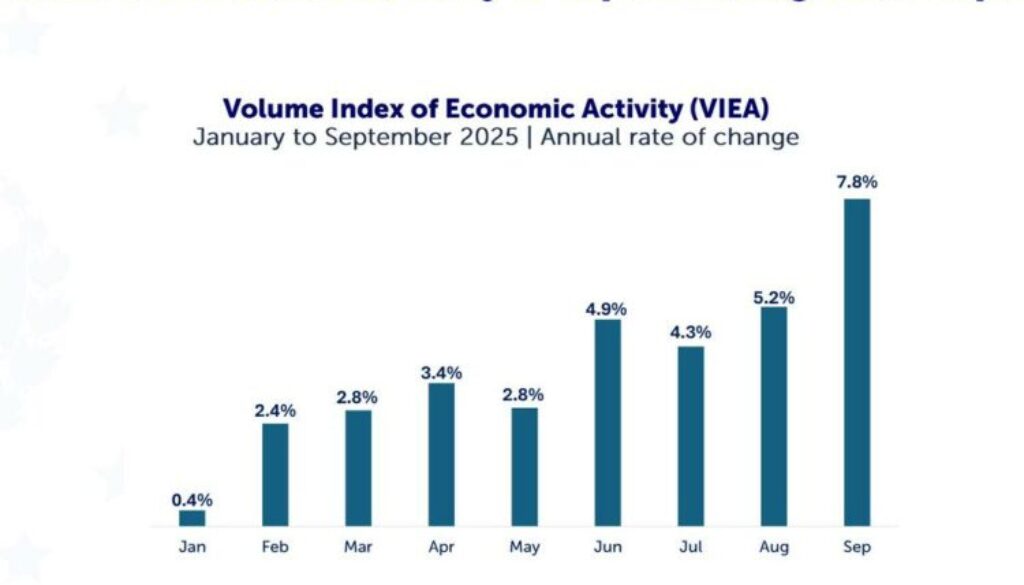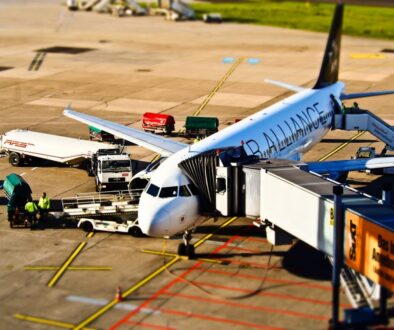The Salvadoran Economy Grows Strongly, Driven by Improved Security
Table of Contents
Contact the Central American Group to explore the foreign investment options in El Salvador and Costa Rica.
President Nayib Bukele recently highlighted a new report from the Central Reserve Bank (BCR) confirming sustained acceleration in the country’s economic activity. The president underscored that “the security dividend is also beginning to pay off economically,” referring to the economic benefits of improved public safety. His statement accompanied an official chart showing a steady increase in the Volume Index of Economic Activity (VIEA) between January and September 2025. This trend has drawn the attention of analysts, business leaders, and multilateral institutions.
Consistent Growth Throughout the Year
According to BCR data, the Salvadoran economy began the year with relatively low growth of just 0.4%. However, as the months progressed, the trend shifted markedly, gaining strength at a sustained pace. By September 2025, the country had reached a growth rate of 7.8%, the highest figure of the period and one of the most dynamic variations recorded in recent years. Many experts interpret this performance as a sign that the Salvadoran economy is entering a broader phase of recovery and expansion, driven primarily by greater internal stability.
The progressive rise in the VIEA indicates that sectors such as commerce, tourism, construction, light manufacturing, services, and transportation are now operating with greater fluidity. The recovery is also reflected in increased circulation of goods, expanded business hours across multiple industries, and growing confidence among both consumers and Salvadoran entrepreneurs.
The “Security Dividend”: A Structural Shift
One concept gaining prominence in both official discourse and recent economic analysis is the so-called “security dividend.” This term refers to the economic benefits derived from the sharp reduction in crime—one of the most significant transformations El Salvador has experienced in recent years.
The elimination of extortion across thousands of businesses—long one of the crimes that most hindered business operations—has allowed small, medium, and large enterprises to reinvest resources, expand their operations, and increase profitability. For many business owners, reducing these informal costs has meant not only financial relief but also the opportunity to pursue initiatives that were previously unviable due to security concerns.
Additionally, increased police presence and the new climate of public order have enabled the expansion of nighttime activities, including restaurants, tourism, transportation, cultural events, and family-run businesses that now operate late into the evening. This dynamism has generated additional jobs and strengthened domestic consumption, producing a direct and positive impact on the Salvadoran economy.
Impact on Tourism and Investment Attraction
Tourism is another sector that has shown significant growth. With new routes, greater availability of recreational spaces, and a sharp rise in foreign visitors, the country is experiencing accelerated development in an industry that for many years was constrained by international perceptions of insecurity. The government has actively promoted emerging destinations and new tourism corridors that connect rural areas with urban centers, giving small producers and entrepreneurs opportunities to integrate into value chains.
Security improvements have also been decisive in attracting foreign direct investment (FDI). Regional and global companies have begun evaluating El Salvador as a strategic location for logistics, services, nearshoring, and manufacturing operations. Certainty surrounding the reduction of operational risks has become a key factor in evaluating new projects, particularly in technology, renewable energy, agribusiness, and advanced manufacturing.
Greater Business Dynamism and Increased Confidence
A stronger security environment has generated favorable conditions for local businesses to operate more steadily. The elimination of threats has enabled thousands of small enterprises to consolidate. It has encouraged the development of larger investment projects, helping generate more formal employment and keeping economic activity circulating within the country.
At the same time, confidence in public institutions and in the government’s economic management has increased. The administration argues that this combination of macroeconomic stability, falling crime rates, and fiscal discipline offers a robust framework for continued investment attraction. Increased transparency in public management—along with the development of strategic projects in infrastructure, transportation, and energy—has strengthened the perception that the Salvadoran economy is well-positioned to sustain its pace of growth in the coming months.
Outlook for the Near Future
The government projects that the positive trend will continue in the short- and medium-term, especially if current levels of security and stability are maintained. Among the factors expected to further drive economic expansion are improvements in logistics infrastructure, the growth of industrial zones, and the implementation of technological initiatives aimed at enhancing the efficiency of the productive sector.
Sectors such as tourism, construction, business services, renewable energy, and retail are expected to maintain strong performance. Authorities also emphasize that increased public investment in infrastructure—roads, ports, water systems, and sanitation—will continue to improve the country’s competitiveness.
Conclusion
The notable increase in the VIEA from January to September 2025 reflects a structural shift in El Salvador’s productive dynamics. The transition toward a safer environment has allowed productive sectors to operate with greater freedom, efficiency, and predictability, creating a multiplier effect across the entire economy. Both business owners and citizens are beginning to see the results of a safer, more attractive country for investment, work, and entrepreneurship. If this trend continues, El Salvador may position itself as one of the region’s most notable examples of economic recovery in the years ahead.
Contact Us
Please use this form to contact us and we will respond as soon as possible:





